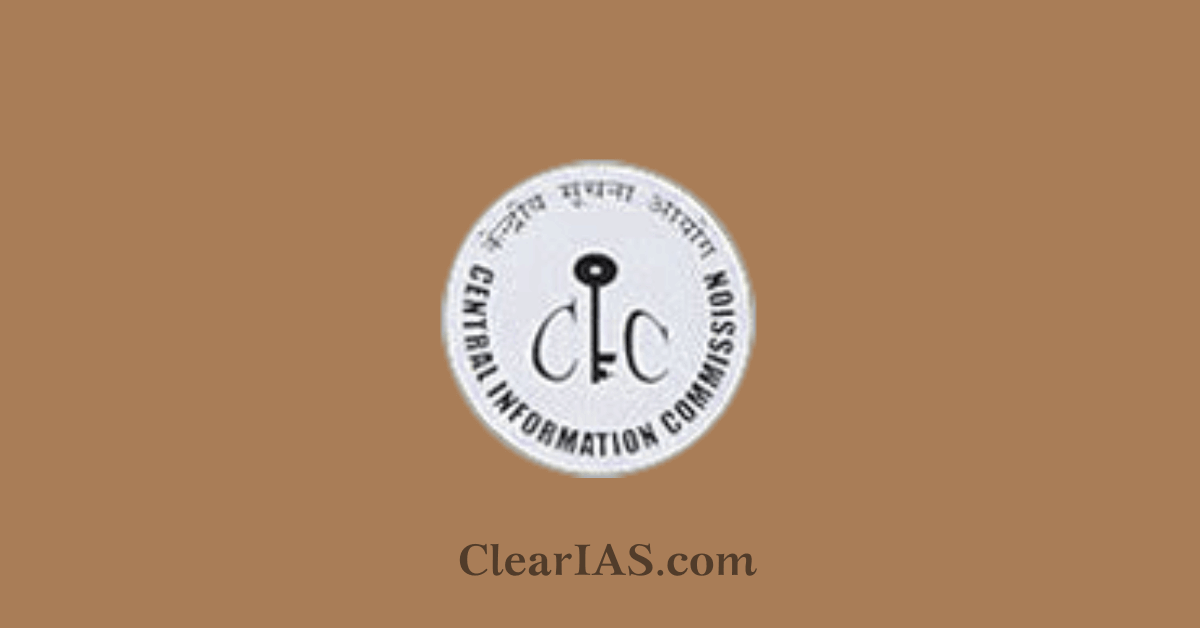
The Central Information Commission (CIC) is an important aspect of the good governance of the country. Read here to know more about CIC.
The Central Information Commission was constituted in 2005 under the Right to Information Act, 2005. It is not a constitutional body.
The jurisdiction of the Commission extends over all Central Public Authorities.
The Central Information Commission shall consist of the Chief Information Commissioner (CIC) and several Central Information Commissioners not exceeding 10 as may be deemed necessary.
The Right to Information (Amendment) Act, 2019 amended the Right to Information Act, of 2005.
The RTI Act, 2005 specified the tenure, terms of service, and salaries of the Chief Information Commissioner (CIC) and Information Commissioners (ICs) at the central and state levels, in the parent law.
- The RTI (Amendment) Act, 2019 removed these provisions and stated that the central government will notify the term and quantum of salary through rules.
RTI Act 2005 vs. RTI Rules 2019
Provision |
RTI Act, 2005 |
RTI Rules, 2019 |
Term |
The CIC and ICs (at the central and state level) will hold office for a term of five years. |
The CIC and ICs (at the central and state level) will hold office for a term of three years. |
Salary |
The salary of the CIC and ICs (at the central level) will be equivalent to the salary paid to the Chief Election Commissioner and Election Commissioners (Rs 2,50,000 per month)
Similarly, the salary of the CIC and ICs (at the state level) will be equivalent to the salary paid to the Election Commissioners (Rs 2,50,000 per month) and the Chief Secretary to the state government (Rs 2,25,000 per month), respectively. |
The CIC and ICs (at the central level) shall receive a pay of Rs. 2,50,000 and Rs. 2,25,000 per month, respectively.
CICs and ICs (at the state level) shall receive a pay of Rs. 2,25,000 per month. |
Chief Information Commissioner and Information commissioners
The commissioners are appointed by the President on the recommendation of a committee consisting of:
- The Prime Minister, who shall be the Chairperson of the committee;
- The Leader of Opposition in the Lok Sabha; and
- A Union Cabinet Minister to be nominated by the Prime Minister.
The Chief Information Commissioner and Information Commissioners shall be persons of eminence in public life with wide knowledge and experience in law, science, technology, social service, management, journalism, mass media, or administration and governance.
Chief Information Commissioner or an Information Commissioner shall not be a Member of Parliament or Member of the Legislature of any State or Union Territory as the case may be, or hold any other office of profit or connected with any political party or carrying on any business or pursuing any profession.
Term of office and other service conditions of CIC and IC:
The Chief Information Commissioner and an Information Commissioner shall hold office for such term as prescribed by the Central Government or until they attain the age of 65 years, whichever is earlier, and shall not be eligible for reappointment.
Power and Functions of the Central Information Commission
The Commission has certain powers and functions like:
- To receive and inquire into a complaint from any person regarding information requested under the RTI act.
- It can order an inquiry into any matter if there are reasonable grounds (suo-moto power).
- While inquiring, the Commission has the powers of a civil court in respect of summoning, requiring documents, etc.
- Adjudication in the second appeal for giving information;
- Direction for record-keeping
- Imposition of penalties and Monitoring and Reporting including preparation of an Annual Report.
The decisions of the Commission are final and binding.
Vision and Mission of Central Information Commission
To play a dynamic role in ensuring effective and efficient participation of all the stakeholders as envisaged by the RTI Act, through the exercise of powers conferred on, and by performing functions assigned to the Central Information Commission in an accountable, responsive, and transparent manner.
CIC’s mission is to ensure smoother and greater access to information envisaged under the RTI Act, to Indian citizens through a citizen-centric approach
Key objectives of CIC
- To receive and inquire into complaints from any citizen as provided in RTI Act.
- To receive and decide upon the second appeal from any citizen as provided in the RTI Act, and RTI rules 2012.
- To exercise the powers conferred on CIC under the RTI Act.
- To perform the duty of Monitoring and Reporting as provided in Section 25 of the RTI Act.
Issues with Central Information Commission
- The transparency in the functioning of CIC has been causing concern.
- There is a huge backlog of cases as CIC takes more than a year to resolve complaints or appeals.
- It has been shown that CIC is reluctant to take action against government personnel.
- The CIC is mostly understaffed and the vacancies are not filled up.
Way forward
The issues mentioned above need to address to ensure people’s trust and good governance.
The Supreme Court also has pointed out the long-term vacancies in the commission and directed the state and central commissions to fill vacancies in a transparent and timely manner.
The CIC needs to get updated in terms of digitization and proper management of records to ensure remote access to conduct hearings and appeals.





Leave a Reply